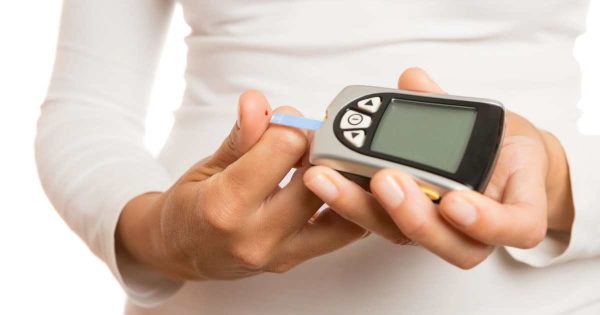If you’re pregnant and expecting to have a glucose test as part of your prenatal care, you might be wondering how to prepare for the test. What can you eat and drink before the test? And what should you do on the day of the test? Keep reading for all the information you need to know about glucose tests during pregnancy.

But first, how do I know all of this?
Hi — I’m Hilary — The Pregnancy Nurse 👩⚕️. I have been a nurse since 1997 and I have 20 years of OB nursing experience, I am also the curly head behind Pulling Curls and The Online Prenatal Class for Couples. 🩺 I even helped in a diabetes clinic during my 3rd pregnancy. I have helped LOTS of diabetic moms, and fielded lots of questions about the glucose test during pregnancy.
Possibly, similarly important, I have taken the glucose test with my three pregnancies, and I understand your desire to PASS that test. 🙂
But first, if you’re at the glucose testing point (usually about 28 week’ish unless they find a reason you should go earlier)… now is the time to start your birth class, so make sure to do that as well!
What is a glucose tolerance test during pregnancy and why is it done
A glucose tolerance test is usually done during the second trimester of pregnancy, between 24 and 28 weeks. However if you have certain risk factors, like weight, or having a previously large baby they may test you earlier (I was tested at 8 weeks with my 3rd baby).
The test is used to screen for gestational diabetes, which is a type of diabetes that can develop during pregnancy.
Gestational diabetes happens when your body can’t make enough insulin to handle the extra glucose (sugar) in your blood during pregnancy. Insulin is a hormone that helps your body use or store glucose for energy.
For most women, gestational diabetes doesn’t cause any noticeable symptoms. That’s why it’s important to get screened for the condition with a glucose tolerance test. If Gestational diabetes is not treated, it can lead to high blood sugar levels during pregnancy. This can cause problems for you and your baby, such as:
-Preterm labor
-Excessive weight gain in your baby
-Increased risk of cesarean delivery
-Breathing problems in your baby after birth
I want to be really clear on the fact that most often there is no way for you to know if you have gestational diabetes. These women don’t tend to feel much different than other pregnant women — so taking this test is truly the only way!
How to prepare for the 1-hour glucose tolerance test
You don’t need to do anything special to prepare for a glucose tolerance test. Just make sure you eat and drink normally in the days leading up to the test.
On the day of the test, you may be asked to fast (not eat or drink) for a period of time before the test. You can usually drink water during this time. I have a whole post on what to eat before your pregnancy glucose test.
The time period where you’re to fast before the test varies, so talk with your provider or the lab to make sure you’re doing it to their specifications.
You will likely have blood drawn before you take the glucose. This is to test how much sugar is in your blood when you haven’t eaten.
Then, you’ll be asked to drink a sugary solution. The amount of sugar in the solution is about the same as in a can of soda. After you drink the solution, your blood will be drawn one or more times over the next hour.
You might feel a little dizzy after drinking the sugary solution. This is normal. Just make sure you don’t drive or operate machinery until the effects wear off.
An hour after you drink that drink they will draw your blood again to see how your body is processing that sugar.
What about the 3-hour glucose test?
Most people start with the 1-hour glucose test (and most pass). However if your numbers on that test are too high, they will ask you to take a 3-hour glucose test. This test is very similar except that the glucose amount is more and your blood will be taken 4 times:
- Fasting, when you first come in
- 1 hour after you drink the drink
- 2 hours after you take the drink
- 3 hours after you take the drink
They almost always have you fast before this test because of the importance of having a true fasting glucose number (not all facilities require it with the 1-hour test).
What are the risks of a glucose tolerance test
I hear that there are no risks associated with a glucose tolerance test.
However, I have personally be affected by a VERY low blood sugar following the 3-hour test. Honestly, so low that I probably should have been in a coma.
SO, I always recommend that on both the 1-hour and the 3-hour test that you bring something that has a nice balance of carbs and protein to eat right after the test is over. I usually take a peanut butter and honey sandwich since it’s easy to keep in my bag or my car. And can easily be eaten quickly.
NOTE: This snack is for AFTER the test is over. Make sure you follow the instructions for the test during the procedure. It is really important.
If you have any questions or concerns about the test, talk to your doctor or midwife. They’ll be happy to answer any questions you have.
How to interpret the results of the glucose tolerance test
While numbers vary a bit from facility to facility these are, in general, the #’s they are looking for:
One hour glucose results:
- Glucose test 1 hour after drinking glucose solution <140
- If they take a fasting test, they likely want it to be less than about 95
Again, if your numbers are greater than this, they will likely ask you to take the 3 hour test.
I have seen people who the numbers were SO high with the 1-hour test, that they just diagnosed them with diabetes and sent them to a dietician for a consult and further testing.
Three hour glucose results:
- Fasting < 95
- 1 hour < 180
- 2 hour < 155
- 3 hour < 140
Most often, they want to see two of this numbers higher than those specified. If they only see one, they often will just encourage you to make dietary changes.
Personally, my fasting level was too high and they called me “glucose intolerant” and encouraged me to follow a diabetic diet, even if my blood sugars didn’t indicate it.
I have heard that there are some places that use the A1C test. This test measures your average blood sugar level over the past 3 months. If your A1C is 6.5% or higher, you have gestational diabetes. I think this might be used by someone who can’t tolerate the glucose test. However, the gold standard is drinking the glucose drink and testing your blood sugar.
If you have gestational diabetes, it’s important to get treated. If not, it can lead to problems for you and your baby, such as preterm labor, excessive weight gain in your baby, and increased risk of cesarean delivery.
Tips for passing a glucose tolerance test during pregnancy
Frankly, don’t have diabetes.
I know, that sounds heartless. But if you have diabetes, you NEED it to be found and be the safest for you and your baby.
However, things I recommend:
- Make sure you’re eating a well-balanced diet the few days before the test. Have a mix of carbs and protein at each meal. Personally, I’d stay away from sugar-filled snacks and drinks those few days.
- You can always take a walk during the test (some don’t allow you to leave, FYI) — that can help bring blood sugar down, but I don’t think it will adjust it much either way.
It is SO important you take the test. Your baby is at risk for stillbirth if you have diabetes and it is not taken care of.
The crazy thing is that stressing out about this test won’t change the results, but that constant worry isn’t great for your baby — so chill out as much as possible!
I also have a post on my best ways to not fail your glucose test!
What can you do if you’re at risk for gestational Diabetes?
If you’re at risk for gestational diabetes, there are a few things you can do to help lower your chances of developing the condition:
–Get regular exercise. Exercise can help your body use insulin more effectively.
–Eat a healthy diet. Eating lots of fresh fruits, vegetables, and whole grains can help your body control blood sugar levels.
–Maintain a healthy weight. If you’re overweight, losing just 5 to 10% of your body weight can help lower your risk of gestational diabetes.
It is important to consider these things even before pregnancy, so I’m glad you’re thinking about it.
What does the glucose tolerance test mean for me after baby?
Most often all the issues with blood sugar go away after the baby is born.
Many hospitals will check your blood sugar the next day or so to see how it is doing, but likely you will be able to eat whatever you want.
However, it does show that you are an increased risk of diabetes later in life, so consider making sure that you diet balances carbs and proteins, and make sure you’re exercising to mitigate that risk.
The reality is that much of this is genetic and we can’t change that — so changing what you can change is best.
But, don’t forget there’s your WHOLE DELIVERY to prepare for too.
If you’re interested in more information about your pregnancy and how to manage it successfully I’d love to help you out in The Online Prenatal Class for Couples. You’re at the PERFECT SPOT to take it. It’s offered on demand, and only takes a few hours.
I love what Casey had to say about it:
“I feel like I got my monies worth with Hilary’s online class. She gets to the point and comes across as real but also communicating well. I watched these with my husband and we both gained a lot of insight. I recommend her program.”
Read more reviews here.
And, if you’re not quite sure you’re ready for that whole thing, check out my free prenatal class. It’s your first step toward getting in the driver’s seat of your birth, and a great way to see if we’re a good fit for each other. 🙂
This is just a part of my series on The Pregnancy Glucose Test For Gestational Diabetes << be sure to read that post for ALL the info on that important test!




 Flank Pain in Pregnancy
Flank Pain in Pregnancy
